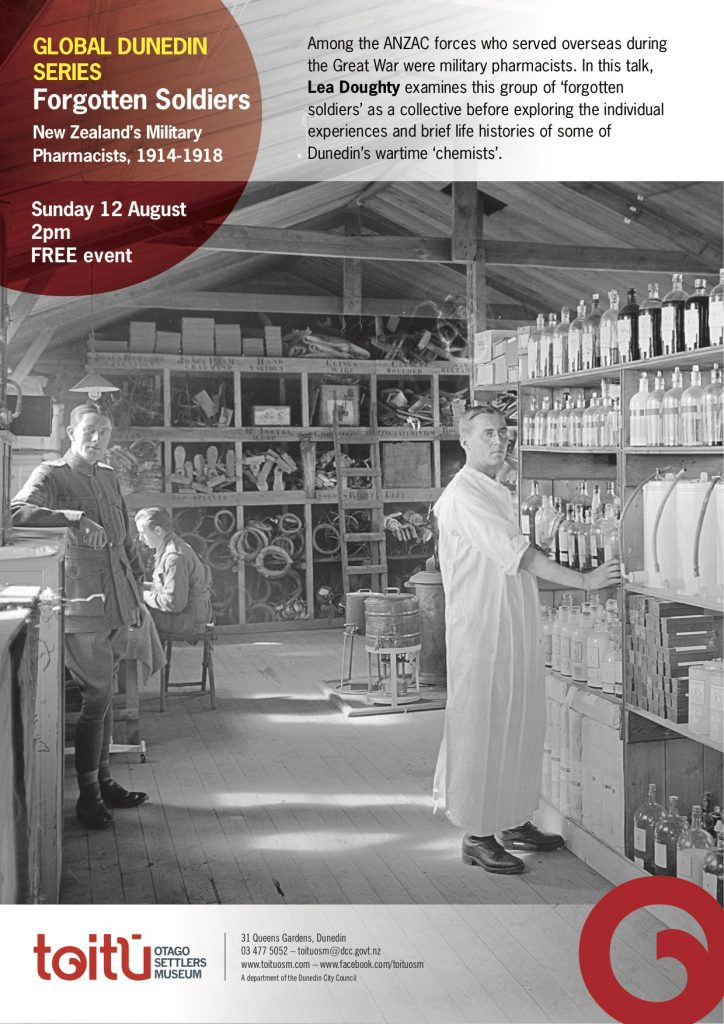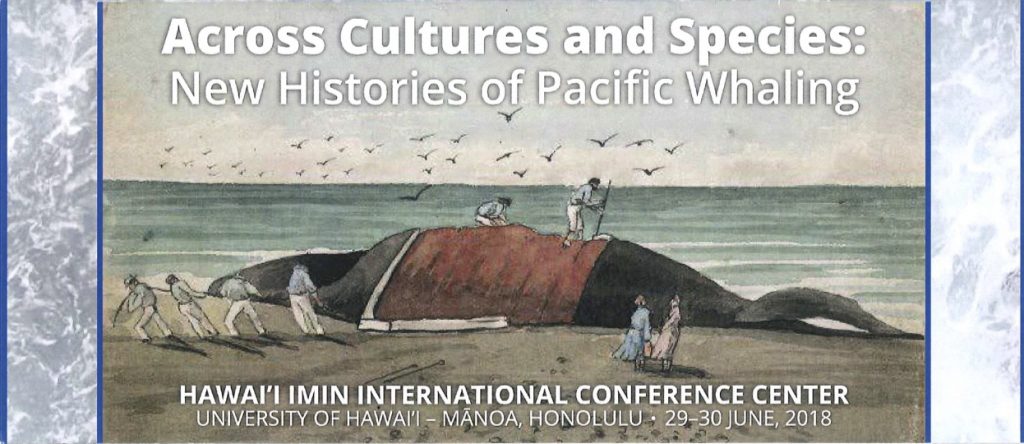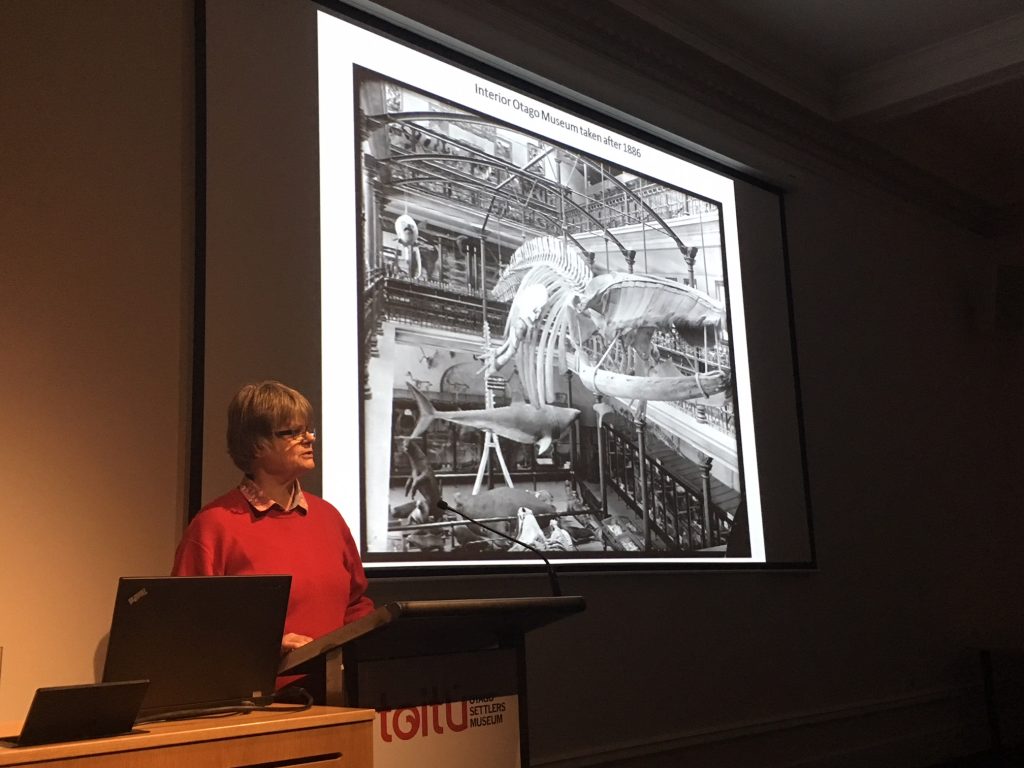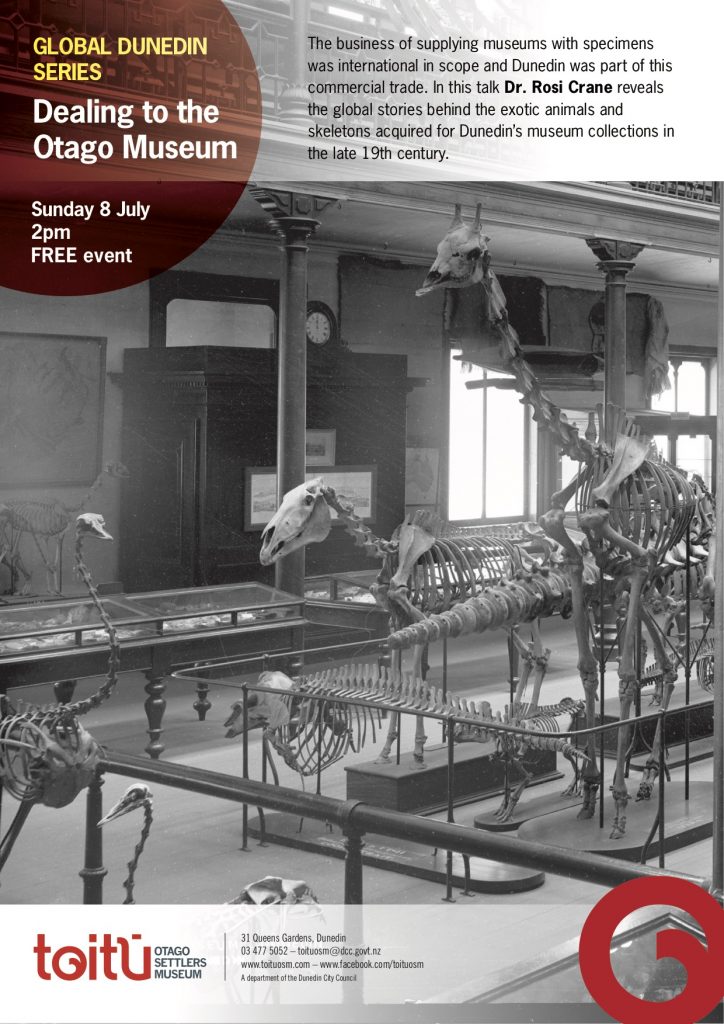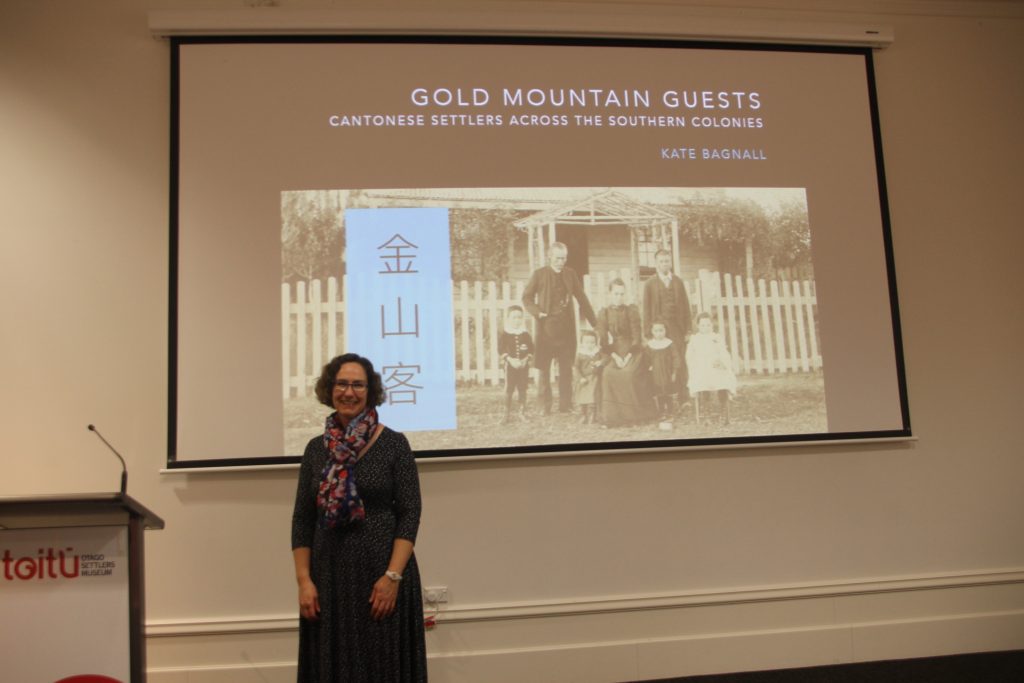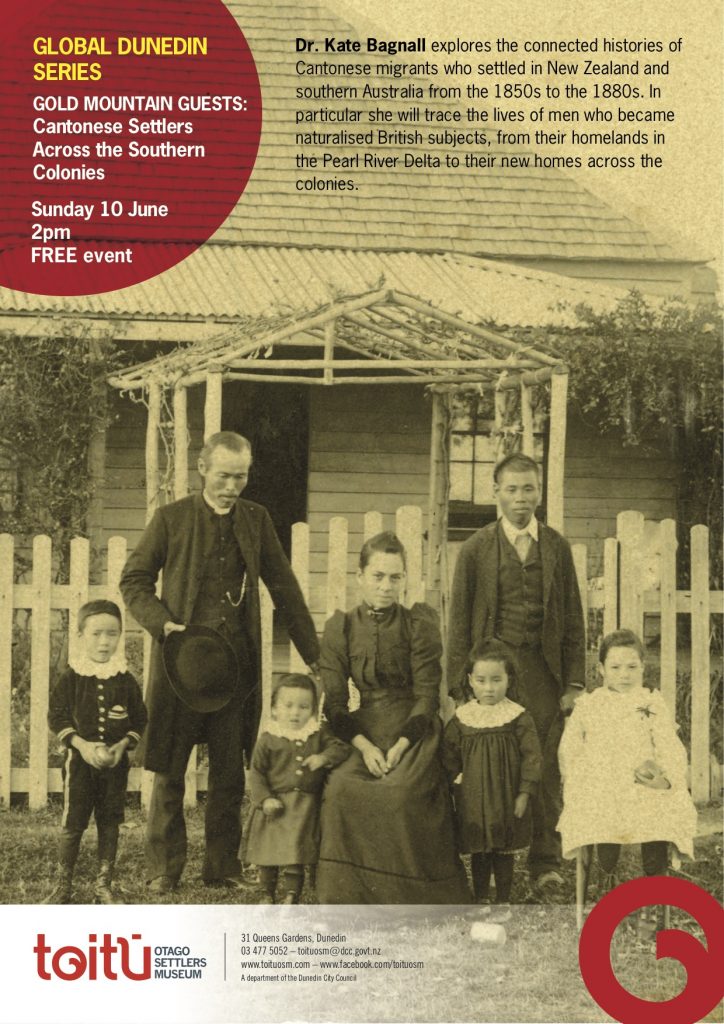Tracing Dunedin’s wartime ‘chemists’
Our next Global Dunedin Lecture will be presented by Lea Doughty (PhD candidate, School of Pharmacy, University of Otago) on Sunday 12 August at Toitū (for details see poster). In this talk Lea will discuss the pharmacists who served in New Zealand forces during World War 1, trace some of their experiences during and after the war, and place this history into the context of the global history of military medicine. This is a free talk and all are welcome!
CFP: Exclusion, Confinement, Dispossession
Curiosity in Things Conference
Just a reminder about this forthcoming conference. Submissions close 15 September.
https://blogs.otago.ac.nz/crocc/2018/05/30/held-in-trust-curiosity-in-things-conference/
Conference Report: Across Cultures and Species
In late June, the Centre co-sponsored a two-day pre-read workshop at Honolulu on new histories of pacific whaling. Participants were invited to think about animal-human interactions, as well as the intersection between environmental and cross-cultural histories. The workshop was led by Ryan Tucker Jones (University of Oregon) with support from Centre member, Angela Wanhalla, and generously supported by the Rachel Carson Center for Environment and Society.
The workshop opened with a paper by Susan Lebo (State Historic Preservation Office, Hawaii) that made a case for newspapers as integral, but overlooked, sources for revealing Hawaii’s whaling history, particularly Hawaiian-language newspapers, which feature Indigenous narratives. Lissa Wadewitz (Linfield College) examined the paradox of the violence involved in hunting and processing whales and their sometimes professed sentimentality for the animals, which she set within a context of a growing animal welfare movement in the United States. Vicki Luker (ANU) narrated the story of whaling in Fiji through the experiences of a chief and chiefly politics, while Adam Paterson (South Australia Maritime Museum) discussed a collaborative project on whalers and cross-cultural history at Encounter Bay, South Australia, emphasising Ngarrinderjeri perspectives about whales. Kate Stevens and Angela Wanhalla (University of Otago) took us to southern New Zealand where they used kinship as a framework of analysis to explore Kāi Tahu women’s participation in the shore whaling industry and their association with the sea. We concluded the first day with Nancy Shoemaker‘s (University of Connecticut) paper on the global trade in whale products and Akamine Jun‘s (Hitotsubashi University) interrogation of coastal whaling in Japan and how this shaped particular food cultures.
Day two opened with a session on Japan. Jakobina Arch (Whitman College) discussed the role of pelagic whaling in advancing Japan’s territorial expansion in the Pacific, while Noell Wilson (University of Mississippi) considered whaling cultures in the 19th century Hokkaido maritime region, focusing on the Ainu. In the second set of papers, Bathseba Demuth (Brown University) addressed capitalism in the early north pacific through the perspective of bowhead whales, inserting whale agency into human history. Jason Colby (Victoria) turned to the capture of grey whales for Seaworld in California, how this shaped scientific research and influenced human understanding of whales during an international movement focused on conservation and protection. The workshop closed with two papers that considered whaling and whales within contemporary Indigenous contexts. Jonathan Clapperton’s (Independent historian) paper addressed Puget Sound Salish Culture and legal claims to being whaling people, while Billie Lythberg (Auckland University) and Wayne Ngata (former Chair of the Māori Language Commission) told the story of Paikea, a whale and human ancestor, embodied by a tekoteko (carved human form) held by the American Natural History Museum in New York, who they hope to return home to his people. The workshop closed with a keynote address from Joshua L. Reid (University of Washington) at the Bishop Museum that centred Indigenous experience and perspectives at the heart of new histories of Pacific whaling.
Globalising Otago Museum
The latest instalment of the Global Dunedin Lecture Series was given by Dr. Rosi Crane (Honorary Curator, Otago Museum) on Sunday July 8th. Her subject was the global trade in animal skeletons, exotic birds, and pelts that underpinned the establishment of Otago Museum’s early collections. This was a truly global trade in which the museum’s earliest curators were enthusiastic participants. In exchange for moa bones and whale skeletons, Otago Museum received exotic overseas specimens. An early example was a giraffe skeleton from a Paris museum acquired in 1874. A key currency, highly desired by international museums, moa bones were sent to Liverpool, Sydney, Aberystwyth, and many other locations. Specimens were also obtained opportunistically, but also through a network of commercial dealers located across the globe. Many thanks to Rosi for sharing her research with a large crowd who were left enthralled and astounded by the global reach of Otago Museum’s collection.
Global Dunedin: The International Trade in Museum Specimens
A reminder that our next Global Dunedin lecture will be given by Dr. Rosi Crane on July 8. Her topic is the international trade in museum specimens during the nineteenth century.
When the Otago University Museum opened in its new building on Great King Street in 1877, amongst other things there was a giraffe skeleton, a stuffed lion, several monkeys, and innumerable birds from Australia, Europe, India and New Zealand. From the outset the collections were international. Many of the exotic animals came to Dunedin from commercial dealers from London, Sydney, Bremen and Prague. Some of the purchase money came from limited museum funds but most came from trading moa bones. Kiwi and kakapo skins had their value too but they were not as valuable as moa. A few scraps of correspondence has survived which tells us the price that these animals fetched, what else the dealers had to offer and what the curators wanted to fill perceived gaps. The business of supplying museums with specimens was extensive and Dunedin was part of this global network of supply and demand. The story of how historical commercial trade practices have impacted on the Museum is told here for the first time.
Global Dunedin Series
In June, the Centre was delighted to host one of our favourite historians, Dr. Kate Bagnall, who was visiting Dunedin to conduct research at local archives for her current project tracing Chinese naturalisation across the British colonies. Kate also kindly presented on an aspect of this research in our Global Dunedin speaker series. In her talk she traced the legal and personal histories of naturalisation, connecting the Dunedin experience into a larger Australasian setting, arguing that tracing naturalisation processes and records helps to uncover different histories of migration and mobility from the standard narrative of single male sojourners. This is particularly important research because Chinese presence in the British colonies is often told through a focus on exclusion and immigration restriction. Incredibly, Kate also presented fresh research barely hours old from her visit to the Dunedin archives, revealing that there were 450 Chinese who naturalised in New Zealand prior to 1908, with 197 of those in Otago. The first in Otago was Louis Gay Tan in 1870. We thank Kate for a wonderful lecture and wish her all the best for the research project.
Our next Global Dunedin lecture will be given by Dr. Rosi Crane on July 8 on the international trade in museum specimens during the nineteenth century. When the Otago University Museum opened in its new building on Great King Street in 1877, amongst other things there was a giraffe skeleton, a stuffed lion, several monkeys, and innumerable birds from Australia, Europe, India and New Zealand. From the outset the collections were international. Many of the exotic animals came to Dunedin from commercial dealers from London, Sydney, Bremen and Prague. Some of the purchase money came from limited museum funds but most came from trading moa bones. Kiwi and kakapo skins had their value too but they were not as valuable as moa. A few scraps of correspondence has survived which tells us the price that these animals fetched, what else the dealers had to offer and what the curators wanted to fill perceived gaps. The business of supplying museums with specimens was extensive and Dunedin was part of this global network of supply and demand. The story of how historical commercial trade practices have impacted on the Museum is told here for the first time.
CFP: Translation and Transculturation in, through, and by Print
The University of Otago’s Centre for the Book has announced a Call for Papers for its seventh annual research symposium, which will be held on 1-2 November on the theme “Translation and Transculturation in, through, and by Print”. The keynote speaker is CRoCC member Associate Professor Lachy Paterson, an expert on Māori newspapers and transculturation.
Call for Papers: Translation and Transculturation in, through, and by Print
1-2 November 2018
Relevant topics might include, but are not limited to:
• The impact of print in NZ in languages other than English
• The impact of print in scripts other than the Roman alphabet
• Collectors and collecting across cultures
• How books travel from one language to another
• Whether transculturation is separable from translation, i.e. can ideas travel irrespective of language?
• The extent to which print communicates across cultures more or less effectively than other media
• The effects of national language policies on the power of translation
• Any aspect of technologies for cross-cultural printing and/or translating
• The extent to which print records or distorts cross-cultural encounters
• Motivations for translation (evangelisation, education, propaganda, support)
• Whether translation inhibits or facilitates transculturation
All of these topics are of potential interest for the Centre for the Book symposium. Please email a 250-300 word abstract to books@otago.ac.nz. Abstracts must be received by 1 September 2018.
If you have any questions, please contact Dr. Donald Kerr (donald.kerr@otago.ac.nz) or Dr. Shef Rogers (shef.rogers@otago.ac.nz).
New Publication on Indigenous Mobilities
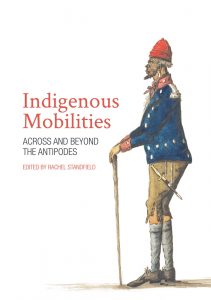 In November 2014, CROCC co-hosted the Indigenous Mobilities symposium at Otākou Marae. This event attracted a number of Australian historians as well as some CROCC scholars, looking at Māori and Aboriginal mobilities of the past. ANU Press, in conjunction with Aboriginal History, have published this research as Indigenous Mobilities: Across and Beyond the Antipodes. This edited collection can now be downloaded free in PDF or eBook form either in its entirety or as individual essays, including those of CROCC members, Tony Ballantyne, Angela Wanhalla and Lachy Paterson.
In November 2014, CROCC co-hosted the Indigenous Mobilities symposium at Otākou Marae. This event attracted a number of Australian historians as well as some CROCC scholars, looking at Māori and Aboriginal mobilities of the past. ANU Press, in conjunction with Aboriginal History, have published this research as Indigenous Mobilities: Across and Beyond the Antipodes. This edited collection can now be downloaded free in PDF or eBook form either in its entirety or as individual essays, including those of CROCC members, Tony Ballantyne, Angela Wanhalla and Lachy Paterson.
Kate Bagnall to give Global Dunedin Lecture
We’re really delighted to be hosting Kate Bagnall (University of Wollongong) for our next Global Dunedin Lecture at Toitū on Sunday 10 June. Kate is currently researching the stories of Chinese migrants who sought citizenship in Canada, Australia and New Zealand between 1860 and 1920. As she notes, the history of Chinese naturalisation in British settler colonies of the Pacific Rim is hidden, mostly because it has been seen through the lens of Chinese exclusion, a history of when it was prohibited by law rather than of when it was allowed. In this project, Kate is exploring the lives of naturalised Chinese, intertwining biographies and case studies with historical analysis of naturalisation law and policy, linking lives with legislation. Her aim is to understand why and in what circumstances Chinese migrants became British subjects, and what it meant for them.
Kate will discuss aspects of this research project at her Global Dunedin Lecture “Gold Mountain Guests”. This is a free event and open to the public. Hope to see you there!

